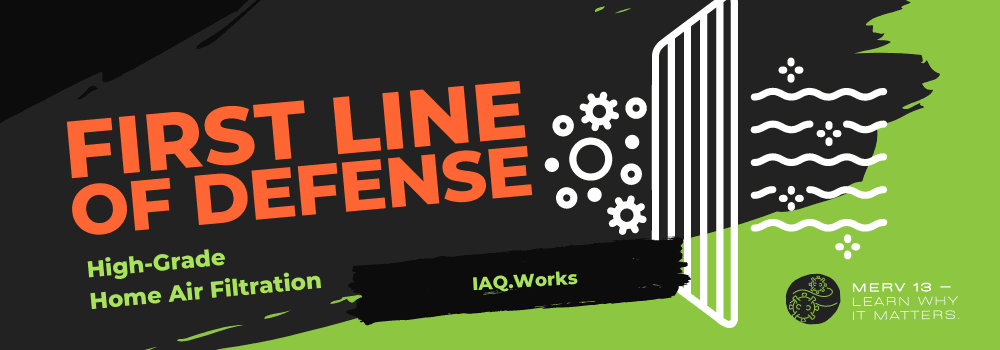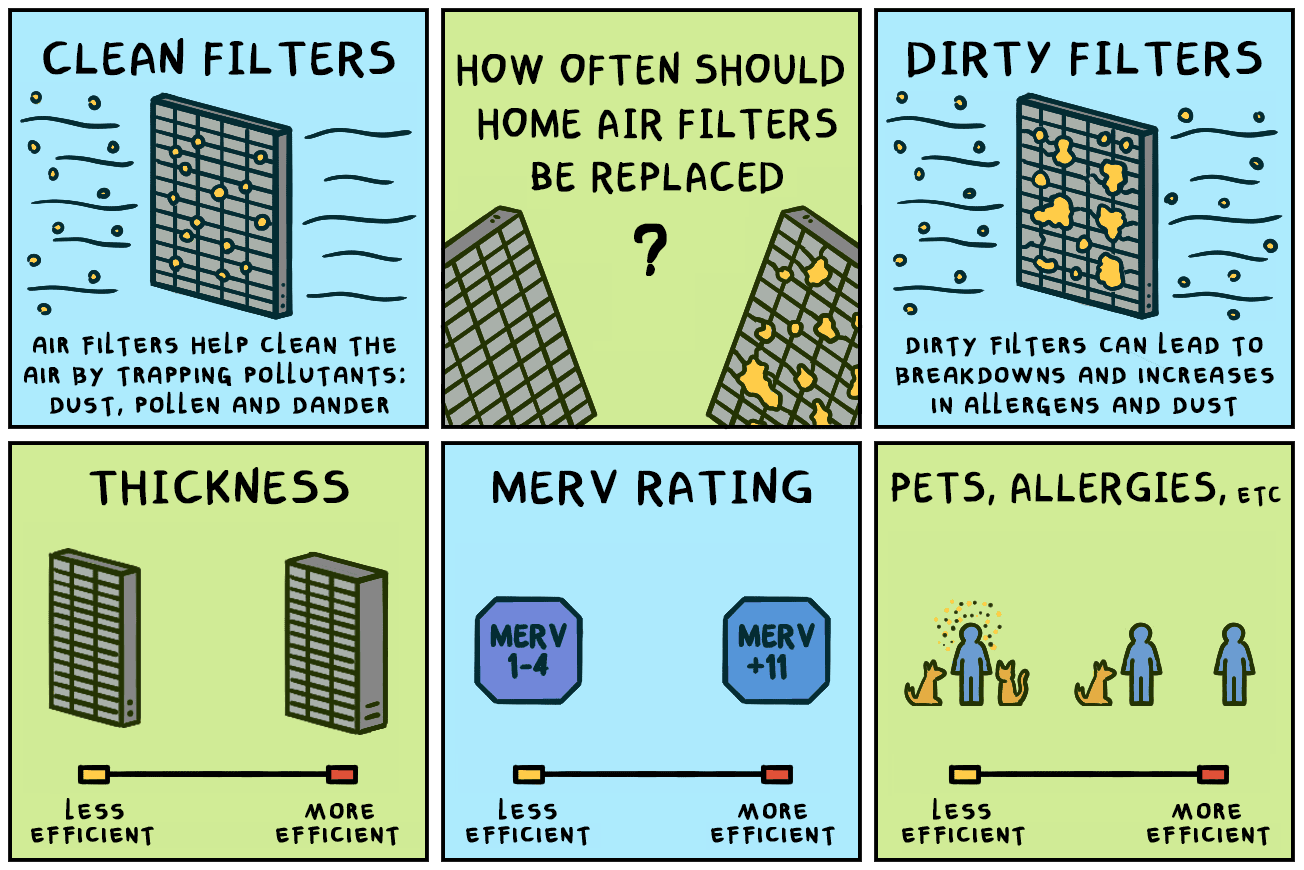Table of Contents
Why Air Filtration Matters
The first step to improve indoor air quality is filtration. An efficient filtration unit in your home will provide the primary defense for both the HVAC equipment and the occupants of your building. Air filters are also vital to keep schools and offices safe and healthy.
To achieve exceptional IAQ and reduce your HVAC system’s energy costs, it’s important to take the time to understand how critical it is to choose the best filter for your home.
Air filtration is one of the most effective indoor air quality solutions. It reduces the number of pollutants in an indoor space by capturing and removing the pollutants—effectively filtering out the bad air and leaving you with clean, healthy indoor air.

Considering we’re indoor air quality experts who think every indoor space should be outfitted with all of the IAQ solutions necessary, we still have to admit that IAQ benefits are not the only reason air filtration matters. In fact, historically, air filters were not even designed for indoor air quality purposes at all. Their first function is to keep the HVAC system itself protected and free from debris, dust and contaminants. The primary function of your home’s air filter is essential to the HVAC system’s success, lifespan and capability.
Therefore, the indoor air quality benefits from air filtration are technically a byproduct. However, it’s a byproduct with a lot of home and human health benefits. Simply choosing a filter to protect the HVAC system overlooks the immense potential of choosing an air filter for home quality and health purposes.
An air filter can protect more than the HVAC system, it can protect you and your loved ones. An air filter can stop more than debris and contaminants from reaching the internal parts of the HVAC system, it can also capture and remove dangerous indoor air pollutants from the air you breathe. And that is why air filtration matters.
Types of Home Air Filters
Choosing an air filter is an important decision. There are tons of air filters available today. They all advertise different purposes, abilities, functions and so forth. They also differ in thickness, efficiency ratings, material, size, etc. They can, however, be largely categorized into a handful of air filter types.
 Whole-Home Air Filters: Looking for a more in-depth comparison of every whole-home air filter type? We’ve got it … read more about the differences between HVAC filters, about filter types and how to choose the best one for your space. Learn more →
Whole-Home Air Filters: Looking for a more in-depth comparison of every whole-home air filter type? We’ve got it … read more about the differences between HVAC filters, about filter types and how to choose the best one for your space. Learn more →
- Flat or Panel Filters: This is the most basic home air filter. They’re incredibly common and the basic go-to filter. These filters have low MERV ratings and are considered low-efficiency. With minimal, if any, IAQ benefits, their primary purpose is to protect the HVAC system from dust and debris.
- Washable Filters: These are similar to flat filters in that they have low MERV ratings. But, as evident by the name, these filters are washable AKA reusable. That makes them a great choice for the eco-conscious homeowner. However, it’s important to note that these filters require more maintenance than the average filter. They must be checked and washed routinely. It’s also important that they dry fully each time, or you run the risk of mold growth.
- Electrostatic Filters: Not to be confused with electronic filters, electrostatic filters utilize static electricity to attract indoor air pollutants. These cotton and paper filters are available in both disposable and reusable/washable styles.
- Pleated Filters: This is a bit of a catch-all category. Pleated filters indicate the filter design. A pleated filter is folded several times, increasing the filter’s surface area. This is what gives it an accordion-like appearance. Choosing a pleated filter is a smart choice because the greater the surface area, the more particles captured. However, simply choosing a pleated design isn’t enough. Pleated filters vary drastically in efficiency ratings and material.
- Electronic Filters: Electronic air filters use a high-voltage electric charge. These plug-in filters vary in technology, efficiency rating, capability and safety. If opting for an electronic filter, make sure to research thoroughly and look for verifiable third-party data (similar to air purification systems). Notably, this filter type will only work for filters placed directly into the air handling unit or furnace.
- Gas-Phase Filters: Also known as activated carbon and charcoal air filters, gas-phase filters specifically target gases rather than particles. Therefore, these filters are pointless for capturing and removing particle pollution. They instead target VOCs, odors and other gaseous pollutants. More often, this is a better add-on IAQ solution rather than the first or sole filter choice.
- Media & Extended Media Filters: Media filters offer the best versatility for homeowners and are the most recommended among IAQ experts. These filters are almost always pleated, range from medium to high-efficiency, require fewer changes and are thicker than standard filters. Most importantly, they are designed with indoor air quality in mind. Rather than solely aiming to protect the HVAC system, media filters purposefully aim to improve IAQ too.
 Sick Building Syndrome and Indoor Air Quality: Learn the signs of sick building syndrome, and the IAQ solutions available to ensure your building or indoor space is a healthy one.
Sick Building Syndrome and Indoor Air Quality: Learn the signs of sick building syndrome, and the IAQ solutions available to ensure your building or indoor space is a healthy one.
Read more →
Understand Filtration Performance
To better understand filtration performance, we need to break it down into two efficiencies: dust collection and airflow resistance. MERV ratings need to be mentioned first.
MERV Ratings
To put it simply: The higher the MERV rating, the more effective the filter is at trapping smaller particles.
Dust Collection Efficiency
Determines how well an air filter traps airborne particles as air passes through. Not all air filters are created equal. In fact, there are currently 20 MERV ratings for air filters.
Airflow Resistance
The airflow resistance is a measure of your filter’s energy efficiency costs. The higher the MERV rating, the higher the airflow resistance, the more energy your HVAC system fan has to expend to blow air through the filter.
How Are Home Air Filters Rated?
The most widely accepted air filter rating system is MERV. An acronym for minimum efficiency reporting value, MERV is a grading system that compares and rates air filters. Designed by the American Society of Heating, Refrigerating and Air-Conditioning Engineers (ASHRAE), MERV is a convenient way for consumers to compare filters and trust the comparisons. A MERV rating is assigned based on how many particles a filter captures and removes from the air.
The lower the MERV rating, the fewer particles the filter traps. The higher the MERV rating, the more particles the filter traps. Higher MERV ratings not only capture more particles, they also capture smaller-sized particles and capture larger-sized particles more efficiently. That’s why filters with higher MERV ratings are considered high-efficiency air filters.
 All Things MERV: MERV ratings are a complex air filtration topic. We’re cutting to the chase and giving our best recommendations, but for a greater MERV breakdown, check out our complete guide.
Read more →
All Things MERV: MERV ratings are a complex air filtration topic. We’re cutting to the chase and giving our best recommendations, but for a greater MERV breakdown, check out our complete guide.
Read more →
What MERV Rating Should I Use for My Home Air Filter?
|
Rating
|
Efficiency
|
Filtration Result
|
|---|---|---|
|
MERV 1-4
|
Low-efficiency
|
Average
|
|
MERV 5-8
|
Medium-efficiency
|
Good
|
|
MERV 9-12
|
Medium-efficiency
|
Better
|
|
MERV 13-16
|
High-efficiency
|
Great
|
|
MERV 17-20
|
HEPA
|
Best (but too much)
|
MERV ratings compare filter efficiency based on the filter’s ability to capture three different particle size ranges: 3-10 microns, 1-3 microns and 0.3-1 micron.
- MERV 1-4 filters are considered low-efficiency. These are the basic filters, like the flat/panel filters, with HVAC system protection alone in mind. This rating range is not recommended for any sort of IAQ purposes.
- MERV 5-8 are considered medium-efficiency filters. These are significantly better at capturing larger particles, the 3-10 micron range compared to low-efficiency filters, however they still miss smaller sized particles.
- MERV 9-12 are also considered medium-efficiency filters, however better than the MERV 5-8 range. These filters are substantially better at capturing the large particle range of 3-10 microns. They differ from the MERV 5-8 range because MERV 9 specifically starts to capture more of the middle particle size range: 1-3 microns.
- MERV 13-16 are considered high-efficiency filters. At this range filters start targeting and capturing the smallest particle sizes 0.3-1 micron. High-efficiency air filtration offers superior air filtering.
- MERV 17-20, also known as HEPA and ULPA, are the best air filters out there. This is the range that produces 99.9% figures. However, this level of filtration is entirely unnecessary for the average home and frankly not conceivable for the average residential system.
Which MERV Rating Should You Choose?
MERV 11-13 is generally the sweet spot for a home air filter choice. This range does significantly better at capturing various sized particles and common pollutants of concern. It also offers a bit of wiggle room to figure out which filter works best with your system. You want to choose a filter that does not restrict airflow. If your home’s system can handle MERV 13 filtration, this should be your first choice. If airflow issues are a concern, MERV 11 is the next best choice.
MERV 13 is likely the highest you can go for a home filter. MERV 14+ is too much for the average home system. Unless constructed with a high-performance system design in mind and increased MERV ability, anything above MERV 14 will likely choke your home’s HVAC system.
What Type of Air Filter Should You Use in Your House?
In sum, the best air filter choice is likely a combination of:
- Pleated Design
- MERV 11-13 Rating
- 3 Inches or Thicker
- Media or Extended Media Filter
Always Talk To a Local Professional First: Finding a qualified and reputable Indoor Air Professional is not an easy task. Let us make it easier for you by compiling a list of local professionals who are available to do the work at your convenience. Get started today with a FREE home inspection & consultation.
Find A Qualified Local Professional →
Frequently Asked Questions

There is no one-size-fits-all answer to how often to change your home filter. Sadly, it depends on multiple factors, like: thickness, filter type, MERV rating, how many occupants are in the home, if pets are in the home, etc.
If you have a basic low-efficiency filter, at a minimum, you need to check the filter every 30 days. It’s likely the filter should be changed this often too. For comparison, a MERV 11+ pleated media air filter can go on average three to six months before needing to be changed. That’s roughly only twice a year!
The bottom line: any signs of filter clogging or a dirty filter means it’s time for a new filter.
Not to sound too alarmist, but it’s true that a lot can go wrong if you don't change your home air filter regularly. Any sign of clogging means the filter is unable to remove pollutants from your space. This is why it’s important to regularly check the filter and change it when it’s dirty.
If you don’t change your HVAC filter, the following issues can occur:
System failure because the HVAC system is working twice as hard to circumvent clogged filters
Increase in pollutants and allergens, because the filter can’t filter out said particles
Increase in utility bill, again because the HVAC system is working harder
Decreased unit lifespan, while not as immediate or obvious as system failure, overworking the system does does hurt your home HVAC system’s lifespan and long-term success
Reduced airflow